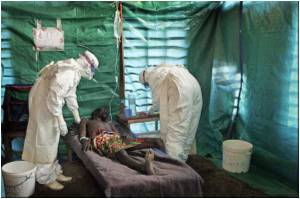The World Health Organization along with the US Centers for Disease Control and Prevention (CDC) has come up with a number of steps that people can use to protect themselves from infection.

Symptoms of Ebola include fever, headache, joint and muscle aches, weakness, diarrhea, vomiting, stomach pain, lack of appetite and in some cases bleeding.
"Transmission is through direct contact with bodily fluids of an infected person, or exposure to objects such as needles that have been contaminated with infected secretions," said Stephan Monroe, deputy director of the CDC's National Center for Emerging and Zoonotic Infectious Diseases.
"Ebola is not contagious until symptoms appear."
- Bodily fluids -
The Ebola virus can be spread though mucus, semen, saliva, sweat, vomit, stool or blood.
"Most people who become infected with Ebola are those who live with and care for people who have already got the disease and are showing symptoms."
"Men who have recovered from the disease can still transmit the virus through their semen for up to seven weeks after recovery from illness," said the WHO.
- Avoid dead bodies -
Ebola has also spread to people who came in contact with the bodies of people who died from the virus, such as during funeral preparations and burial ceremonies.
"People who have died from Ebola should be promptly and safely buried," said the WHO.
- For health care workers -
Patients from areas where Ebola is active and who are showing these symptoms should be isolated from the general public, the CDC said.
Health care workers should follow infection control precautions. They should wear face masks, gloves and long-sleeved gowns to shield themselves when treating patients.
The CDC also recommends routine handwashing before and after contact with any patient who has a fever, as well as safe handling and disposal of needles and syringes.
The incubation period for Ebola -- meaning the time lapsing between infection and the onset of symptoms -- is 21 days.
- Avoid raw meat -
Ebola gets into the human population after people come in close contact with the blood, organs or bodily fluids of infected animals. Fruit bats are Ebola's natural host.
"In Africa, infection has been documented through the handling of infected chimpanzees, gorillas, fruit bats, monkeys, forest antelope and porcupines found ill or dead or in the rainforest," said the WHO.
People should avoid eating or handling raw bushmeat.
If an outbreak is suspected on a pig or monkey farm, the WHO recommends immediate quarantine of the premises, followed by culling of the infected animals "with close supervision of burial or incineration of carcasses."
There is no animal or human vaccine against Ebola.
Source-AFP
 MEDINDIA
MEDINDIA



 Email
Email





